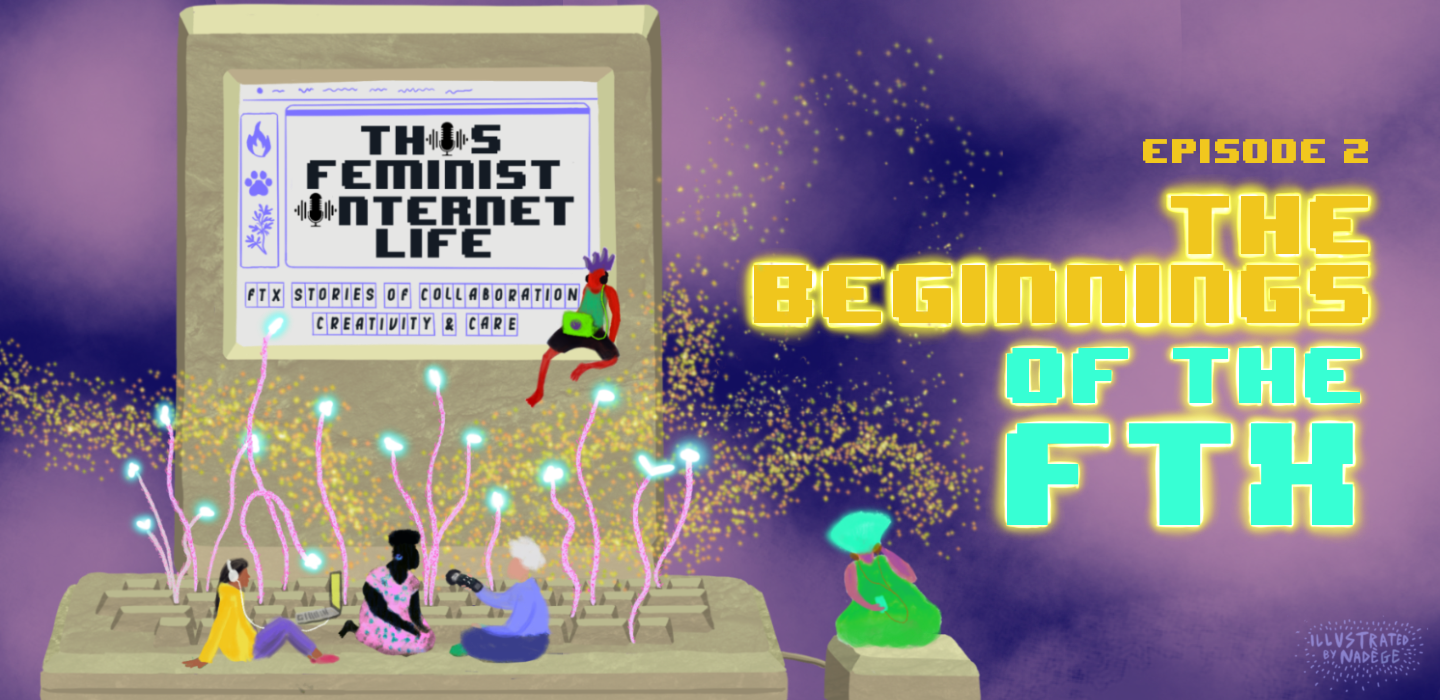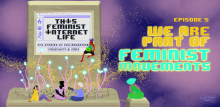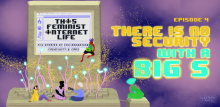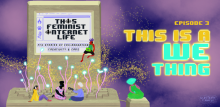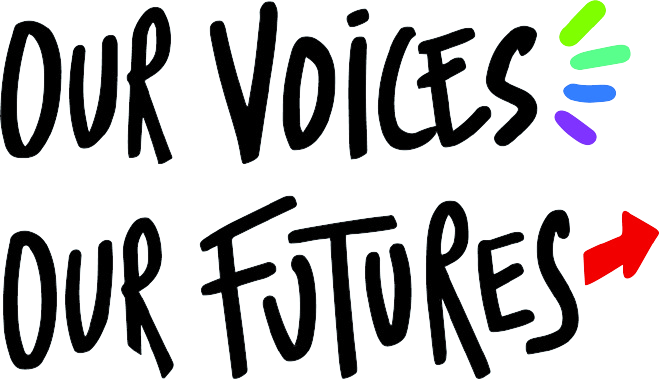The beginnings of the FTX
In this episode, we answer: Why Feminist Tech eXchanges? Directly from the mouths of the digital care trainers who were part of the beginnings of the FTX and their personal journeys with feminism and technology. Talking about why holding space with a feminist lens and intersectionality matter, specially while figuring out technology.
Narrator (Ray): Clip six. That's where we're starting again. Hi, and welcome back to this... I'm not adding another mark. Hi, and is that your phone that vibrated?
Narrator (Jennifer): Sorry, yes.
Narrator (Ray): Hi, and welcome back to this Feminist Internet Life, FTX stories of collaboration, creativity, and care.
Narrator (Jennifer): In the last episode, we went to Beijing, came back, and briefly spoke about what FTX stands for. We spoke on how the Feminist Tech eXchange allows for safe, creative, and feminist spaces of exchange and experience, where the practices and the politics of technology are informed by local and contextual realities of women.
Narrator (Ray): On this episode, we will look at the feminist practices and politics of technology.
Narrator (Jennifer): Where the feminist principles of participation, of holding space and intersectionality reign supreme, and why all of these matter.
Narrator (Ray): Welcome to episode two. We are your hosts Rachel Wamoto and...
Narrator (Jennifer): Jennifer Radloff.
\- Intro music -
Narrator (Ray): We sat down with these incredible people to talk not only about the FTX, but also about their personal journeys with feminism and technology. Curious how these two experiences meet, whilst recognizing the significance of their engagement with technology through a feminist lens. We were also curious about the influences of the community that surrounded them.
Jac: I'm Jack, Jackassmkey. I am based in Malaysia. I do my activism with my feet on the ground here and my bum on the chair that's been seated in this space. I am a feminist tech activist. I've been doing this for a while and let me see how I got into this.
hvale: I love this difficult question. Existential, I guess. Uh, uh, well, this is evolving concept. So, I'm a feminist. I think this is the one constant. I always say that I'm a feminist. And then it comes writer, a poet, when I'm at good terms with myself. I am an activist. Um, I'm trying to become an elder and not just to get old.
Cheekay: Uh, so I, I'm Cheekay Cinco. I'm, I'm in the Philippines. I born and raised, um, in the, from the Philippines. I am a feminist activist, technology trainer and facilitator. I suppose that's the, those are the hats I wear the most. Hm, yeah, and that's who I am.
Smita: So, I am Smita. Um, I am currently joining in from New Delhi in India. But I've lived in different parts of India over time and I'm not from Delhi itself.
Shubha: I am from Nepal. Hmm, yeah, given the topic of the discussion, I would say I'm a feminist digital security trainer, which I always hesitate to, to start with sometimes. But yeah, let's reclaim it.
Jac: I think I've almost, you know, I'm off the generation where we kind of be, you know, technology isn't so bad and so scary, but it's a digital technologies that is, um, but it's something that's really curious and something that is full of possibilities and I've always kind of liked it. But I think the moment where it became fused with my feminist politics is when I went for a women's networking support program, WNSE training. Uh, my first encounter with APC when I was a baby feminist and I was working in Shelter for gender-based violence, hum, in Malaysia. And I was doing the comms and the web work, and I told them, "I don't know anything about this". They're like, "don't worry, we'll send you for trainings". And this was one of the first trainings that I went through and I went there like, you know, completely prepared to learn. H T L is that long ago, like h they have to build a HTML website. But what I got instead was, uh, something entirely different. And I remembered one of the first few sessions, uh, that we all sat through was with Pi Villeneuve. Uh, and Nadi, and Pye was kind of going through the history of, uh, the history of digital technology, you know? And she just unpeeled the kind of like, gendered history of digital tech for me. And that made me realize that, "oh, of course, like, of course technology is not neutral and is gendered and has a very particular form of historicity that's very male, that's very white, that's very northern".
And it got me very curious about all the other kind of hidden contributions of people who have contributed to the development of this field who are invisible or are voiceless, or who maybe look like me or you know, uh, or people that, communities that we work with and are grounded with. So that was like a aha moment for me that really, um, politicized technology for me, uh, in that sense.
hvale: When we started this initiative here in the region was important for civil society in the region that was still on dialogue. When we started working with women's rights organization and local initiative, I wanted as a feminist to find a feminist... A positionality perspective, I didn't feel confident that I had, but I was sure that it exists. And that's why I started really searching all over the places and then I found... and that kind of was the Women's Rights Program, introducing to the world of the gender evaluation methodology.
Narrator (Jennifer): Valya just mentioned these three important words, gender evaluation methodology, or GEM. This was first elaborated in 2001.
GEM was developed to help determine whether a project or initiative, including technology, is really improving the lives of women and promoting positive change in the community. APC developed GEM in collaboration with regional partners to facilitate the process of learning about using ICTs for gender equality and to increase consciousness on the possible negative impact of ICTs on women's lives.
GEM is used to investigate whether ICTs are being used in ways that change gender biases and roles and do not simply reproduce and replicate existing ones.
hvale: I was looking at the intersection of gender and technology, which I knew, but I didn't see how it could be applied to technology. I cannot think of anything that I'm trying to do that is outside of a feminist perspective. And, of course, feminism evolve. There are things that we don't understand, and then as someone is our a opener, and then we learn, and we understand, and we adapt, and then we change.
Narrator (Ray): Digital safety is an aspect that is crucial in how we navigate the Internet. Especially when we think about its impact on our real lives.
Smita tells us how they stumbled into it all.
Smita: A lot of times, digital security and things are seen as, like, things which are separate from your personal life, but for me, it was very much, uhm, it came out of necessity. I identify as queer and non binary, and, when I was young, I was brought up in a Muslim country. Where, you know, any content which even referred vaguely to like queerness or LGBTQ or like sexuality was banned there. I'm 30 years old right now, and I'm one of the people of those generation who grew up with technology. When I was around 10 years old, my father's boss who was already "techie" sort of a guy, I don't know what he was thinking, he gave a pendrive to my dad saying, "Oh, give this to Smita. She likes computers. So she might. Uh, she will like what is there on this". And my dad gave it to me. I don't know what he was thinking. I was in 4th grade at that point. A ten year old, eleven year old. Hm, what he had, he said that, uh, and my dad gave it to me saying that, oh, you connect this to the computer, and then you'll be able to access all the websites.
Now, I know that what that was was a VPN, and this was in like early 2000s sort of a thing. I didn't know it was a VPN at that point. I just knew that, oh look, it's this magical device which is now letting me access all the site. A few years down the line, I would use that to go on to like LGBTQ forums, to go to websites which were otherwise blocked in United Arab Emirates.
And as I was doing this, I also was very aware. Intuitively, that whatever I'm looking at, especially around fairness, would not be received well by my parents. Um, so I would do things like, you know, the simple things like clearing your browser history, you know, things like that, or like using incognito. At that time, I didn't know anything better than incognito.
So, really like digital security for me was born out of need, right? And I love, I love the internet. I love technology. And this was just another element of it, and, you know how they say that necessity is the mother of invention, or innovation. It, it, it was that for me.
Narrator (Jennifer): For Vale as well, community was important.
hvale: I don't know how to work alone. It's depressing, it's alienating. So, I think that before then arriving to digital safety and care, I arrived to facilitation, what in my early age it was called, you know. I think the trainers or people were thinking of you as an expert of some sort. But for me, it was how we can have a moment in which we can learn from each other, what we know about an issue. And then realizing that it's not enough to just come together, that you need to understand something about space, people dynamics, time. So, I started looking around for what where from to learn. And I wanted to learn from feminists. I wanted to... I was convinced that it was a feminist way of doing all these things, and I couldn't find until I find the Women's Rights Program at APC, which we are talking about early 2000. They didn't, was not ashamed of call, of calling themselves feminist and looking and talking, advocating for a feminist way of using technology.
Narrator (Ray): Cheekay, too, found her way into digital safety and care by chance.
Cheekay: I started around the digital safety work around 2006 or something. Uhm, by necessity, it's, it's really just, I stepped into it because, I had experience working with technology training and there was a training happening. Where the trainers, who are all male kept on speaking in a language that was not accessible to the activists that they were trying to train.
And so kind of, I had to informally step in to... To help translate some of the concepts because I understood enough of the concepts to be able to put them in a human understandable language, you know, and that's how I kind of stepped into digital security training as a kind of Interpreter, if you will, between tech, very, very technological concepts, and then how does that apply to activism work?
And so that's, and then we were also doing, I was also doing a lot of work with, yeah, uh, vulnerable groups in the region around technology.
Narrator (Jennifer): Having the understanding that technology reinforces some of the same power relations that feminists and activists face in their daily lives came the need for a feminist approach to digital safety and care, and that starts with putting care at the center rather than fear. But embedding feminist values and digital safety practices is not an easy task and requires a lot of methodology and creativity. Shiba had this to say.
Shubha: I think it is quite important conversation to have at this moment. Hm, especially given we have been hearing a lot of conversation around digital safety and security from state level, but also from civil society, like recently Commission on Status of Women, CSW, the 2023 theme is also around digital innovation, right?
So, I guess we are borrowing language of digital in feminist spaces or women's rights spaces. But oftentimes a lot of digital safety and security trainings are focused on a very technical tool or very much focused on threat and violence. So, having a feminist approach to this whole conversation will bring, bring the conversation that feminist movement have been bringing for last centuries or decades on system inequality and injustice, uh, to marginalized groups, right? Like women, queer folks, other marginalized groups, like why are there systemic inequality and where does that play whenever it comes to digital safety and security? Why certain groups need more security or why are there more risks to certain groups?
Narrator (Ray): As we know, online spaces are not detached from offline ones and it's not a surprise that groups that are most targeted in real life have more threats online. People that have to fight for their existence in their daily lives also do not have safety guarantees in online spaces. Online prejudices and hate speech can escalate to the exposure of personal details of people's offline lives and endanger them even more.
Narrator (Jennifer): When we explore the inequalities in society and work towards inclusive digital safety, we start to see how they go hand in hand. And it's through this connection that we truly grasp the deep relationship between social justice, technology and the urgent need for safer spaces online. You know what I was remembering from CSW is that you and Angela were the ones who were the first people to start really delving into and exploring, what we then called violence against women online. That came up, I mean, that's when we started talking about digital safety.
Jac: So, I think that because of the work that I was doing before I got more engaged with the digital technology work which was with APC and with the Women's Networking Support Program with APC. I was doing work around gender based violence. I was saying, "no, I worked in a shelter and..." it was, um, it also helped to provide me with this kind of like framework to unpack power because gender based violence is often one of the most visible and extreme form of manifestation of imbalance and disparity in power. So, working out of that and then sort of engaging into this new space of technology, digital technology, which was, you know, at that time was like, wow, it had this potential of like democratizing the world. It had this potential of like, you know, enabling different forms of power structures and different ways of relating to each other. So, it was interesting to kind of like, okay, seeing these two, uhm, these two trajectories of trying to think through, gender disparity and discrimination on the basis of sexuality and identities. To, to have them in conversation with each other and the impetus for that was also really trying to understand this emerging phenomenon that was happening, but which didn't really have a name in that, a lot of women and a lot of younger women as well were really starting to, we're getting things like SMS messages from people they didn't know, and they were often sexualized, they were often threatening, they were often saying things like, you know, "I know where you go and like, uh, I know what you're doing". And then it would be like, it would be sexually threatening in different ways. And it was very scary because it felt like it was this omnipresent person who seemed to be able to, it's like panopticon, right? Like they can surveil you and they know what you're doing, but you don't know where it's coming from. And they couldn't also understand it because digital tech was so new, but there was something that was happening where technology also became both a site for very familiar forms of gender based violence. I mean, stalking is not new, it's not a new experience for women, but this was a new space in which it was happening. And then it was also new tools in which this was being manifested. So, so that was trying to kind of like, understand and unpack this and also provide recognition for this and to follow this into the, you know, the really important work of ending online, ending violence against women that women's movements have been doing since like, you know, really advancing very strongly at least since the 80s.
And this like trying to fill in the emerging dimension of this and into this work, and at the same time, to not also do this at the expense of actually, there are possibilities with emerging digital technologies to reframe and recast certain kinds of very crusty relationships that social and power relationships we have with each other. And how do we do this in the way where we know that access to tech already has a gender disparity and that science and technology has always framed itself, the inequalities are manifesting itself here as well, but at the same time, there is an exuberant possibility that to reconfigure and reshape things because it is emerging. So how do we hold these two together and a way to do this is really to also understand it, right, unpack it from where, from what we know. Our realities, our experiences and also our frameworks and our analytical frameworks and our ways of like engaging with power.
Narrator (Jennifer): So just to shift from, from WENT (Women's Electronic Networking Training )and how, you know, it sort of this whole thing around women and ICT started shifting. And you were very seminal in shifting the, I suppose the language and the naming and the activism in a way towards a more, um, including feminist in the language and shifting towards what WRP were naming the Feminist Technology eXchange. I just want us to move on to the impetus for you writing the feminist politics and practice of technology document, which is still being used.
Cheekay: So, between, between WENT and the feminist practice of technology piece, there were a few things that happened. One was I got involved in GEM, which is like the Gender Evaluation Methodology, which stuck me on a, I suppose, on a more political, more theoretical path than just the practice that we were doing in WENT.
So, WENT was, was really around practicing how do you do... Technological training, for women and people who do not have access to technology the same way that other people might have the technology. So, a different set of challenges. And then, and GEM took me on a, on a path that's more kind of like, theoretical, and really understanding the gender nature of technology, and the work that we do, and not just training, you know, like, all aspects of technology work. But at the same time, I was also doing a lot of other training for groups in the region that were at risk. And then, and then, yeah, and I really felt like when we came up with that idea to have the FTX, like the Feminist Tech eXchange. For me, it came from a point where, yeah, I've been working with a lot of cis man, in the technical trainings that I was doing. And I felt like they're, and then comparing that with the experience of **WETS**, which were kind of women led, there was a real difference for me aside, as far as like how training and learning is approached. And because of how GEM has kind of organized my thoughts around gender and understanding gender analysis, it really was around that.
It was really kind of like trying to figure out for myself what is it that makestraining practice or a training methodology feminist. And the original document for the Feminist Practice of Technology is really a blog post, no? That I kind of just wrote. It was really kind of maybe a reflective piece around all of that kind of coming together.
And then, that kind of, but that was also because we were looking forward to the FTX and we needed to somehow... Make a case for like, why was there a need for a feminist technology exchange as well? So like, I think those things kind of, for me, happened at the same time.
Narrator (Ray): Unlike other approaches that focus on fear and strict do's and don'ts when it comes to our digital presence, feminism takes a different route. It's non threatening and non prescriptive. It's all about creating a safe and inclusive environment where individuals can freely explore and express themselves. That's what makes it so refreshing and empowering.
Shubha: I guess what's creative within feminist approaches to safety is it is non threatening. It doesn't come from like, here you have all this risk because of your digital presence. So don't do this, do that. Like it's not prescriptive as such. It's more playful. It's more vibrant. It's more fluid, you know, so people can pick what they want to do and people can decide based on their own agency, what they want to do and what they don't want to do at certain point of time and want to adopt them or, or keep some for future. So, a lot of power here is on the individual of how they want to approach to the conversation and what they want to take forward. And then I guess another aspect of feminist approach to this conversation is also around how we don't think, how we don't want someone else to come and teach us, right? Because women have always been told how they don't know, they don't know certain things. And looking at the trend for past couple of years, even with the distal safety and training, safety and trainings, usually there is a man or man from privileged group coming to marginalized group and telling them they should earn what they should do. So, a feminist approach to this whole thing is also countering that, making it more creative, making it more interactive, instead of making it very directional. And then building on what people already know, rather than just adding more information or tools in someone's gadget.
hvale: The FTX, or a feminist methodology approach, is really answering to the why. Is, is not so much focusing on the actual tool, you know, how you do, I don't know if it's a, a VPN or an encryption key is not so much important. Yes, of course, we need time to give also people actual, no?, but those technology, those things change. So, it is more about going through a process where the question are asked and when the framework are posed. And where a principle of solidarity, of a presence, of a really positionality are used throughout. So, there is... the feminist approach, it reflects about the technology, it's about the relationship that people bring. And this is all over and within. It's really the fabric of the curriculum.
Jac: There's something truly powerful about figuring out technology. Like, you know, having it in your hands and kind of like figuring out the corner of it and really understanding how it works. And then really understanding, "oh, so this is why XYZ", that's how we can engage with it in a way that makes sense to me, in a way that is like, yeah, that is aligned with my vision and my politics and my principle.
Narrator (Jennifer): Understanding and demystifying technology is so powerful. It has an influence in how we understand the world and act upon it, both individually and collectively. From empowering oneself and generating confidence, through creating space to share experience and raise voices, it can actually make significant changes in society. Take the MeToo movement, for example.
- television news soundcast - Around the world spoke out against sexual harassment using just two words, #MeToo.
Narrator (Jennifer): It has scaled from social media and a hashtag and generated global commotion and understanding about sexual harassment and rape culture, ending up taking to the streets and shaping public policies.
Smita: Gaps with relation to technology that came up was around the MeToo movement, right? Uh, because... It was an instance where suddenly a lot of women were using technology to talk up, speak out about violences that they've experienced in the offline space. I think it was a very important instance where people, you know, were using technology very actively. And it was a very important instance where you could see the merging of the virtual and offline lives come together. A lot of activists, particularly, not limited to, but particularly a lot of all the activists were talking about, you know, this is not activism just because you talk up online. You know, it's not activism.
Well, I think, unfortunately, a very well known and a very important feminist said something along the lines of though "this is fingertip feminism" or like, you know, "fingertip activism", like referring to like the usage of keyboards. I think like, this was a very important point when I have an instance when like you could suddenly see the gap so clearly, right? This gap that only one form of activism is acceptable form of activism. Only one form of one way of speaking up is an acceptable way of speaking up.
Jac: I think one cool thing about the evolution of the of kind of like this feminist practice in politics of technology around safety and security around digital safety and security is that it's also with more new people coming in, it's also starting to integrate and build and develop some really, really cool work around, wellness and around dealing with trauma and around kind of like, you know, well being in a much broader way. So, I feel that that's definitely a growth and an evolution that is very specific to feminist engagement with this field. Uh, that I feel very hopeful around also and excited about. Yeah.
Narrator (Ray): So what's really dope about feminist digital care trainers is that they're not just outsiders looking in. They're actually part of the movements they train. They're right there in the trenches. And you know what? That's pretty awesome. It brings a whole new level of authenticity and understanding to the table.
Cheekay: One thing that's unique to feminist digital security trainers or safety trainers is that we're part of the movements that we train. We don't, we don't helicopter in or parachute in and then leave, right? I think there's space for that. I'm not completely dismissing parachute trainers, I've done parachute trainings because that's what was asked of me. But I think more and more the role that feminist digital security trainers and safety trainers play is they really don't see themselves as, I don't see myself as separate from whatever movement that I'm training with. If I don't understand what their issues are or what, what the challenges they face are I'm not going to be an effective trainer. It's not, I think that's one of the, maybe pillars of feminist digital safety training. A real understanding and embodiment of what the communities and movements that you're training with are facing.
Narrator (Jennifer): In episode three, we explore why the FTX safety reboot was created, and the significance of having a feminist resource on digital safety and care. A reminder that this curriculum is a training curriculum made up of several modules for trainers who work with women's rights and sexual rights activists to use the internet safely, creatively, and strategically.
We're going to hear from people who collectively designed and wrote this curriculum as to the process of writing this, and we look at how to use the modules. We will hear about the experience of feminists, trainers and facilitators in using the curriculum and adapting it to different contexts.
Narrator (Ray): We would really like to thank Smita, Shubha, Jac, and Vale for their contribution and their service.
Narrator (Jennifer): This episode is a production from the Association for Progressive Communications Women's Rights Program and the Our Voices, Our Futures Project.
Narrator (Ray): This Feminist Internet Live! FTX Stories of Collaboration, Creativity, and Care is produced by Rachel Wamoto, Nadege, and Brunz.
Narrator (Jennifer): Your hosts are Rachel one and me, Jennifer Radlogg. See you next time.
Narrators (Ray & Jennifer): See you next time. See you next time. See you next time. See you next time.
